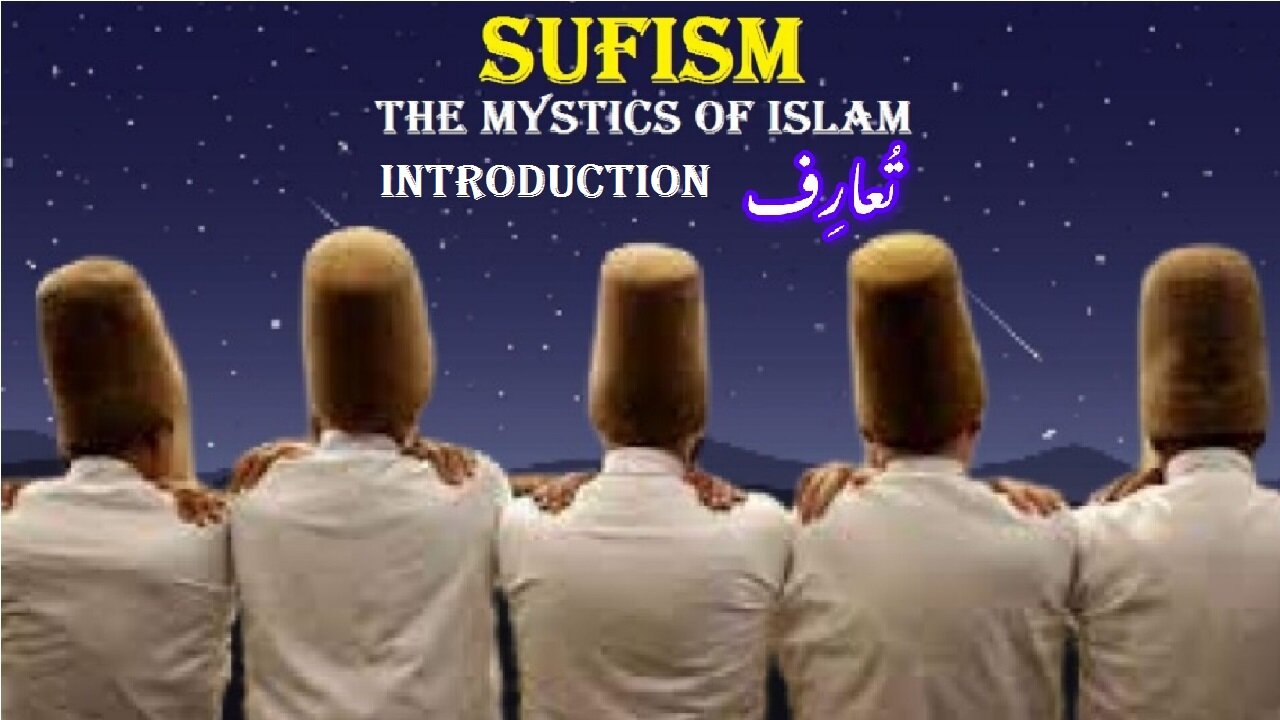Premium Only Content

Introduction of Sufism Figures who spread Islam through spiritual means تصوف کا تعارف
@islamichistory813, #sufism #tasawwuf #sufi #islamicmystics #divinelove #sufipoetry #allahlove #dhikr #rabiabasma #rumi #jilani #sufiteachings #faithjourney #innerpeace #spiritualpath #islamsoul #sufilife #heartpurity #mysticsofislam #lightofallah
Introdcion of Sufism: The Mystics of Islam
Asslamoalaikum,
Welcome to our new and deeply spiritual series “Sufism: The Mystics of Islam”, a journey into the heart of divine love, purity, and devotion. Through this series, we will describe the timeless teachings of the Sufi masters who devoted their lives to finding closeness with Allah, spreading peace, compassion, and unity among mankind. Each episode will unveil the hidden beauty of Tasawwuf — the inner dimension of Islam — where hearts are purified and souls are enlightened by the remembrance of the Almighty. Join us as we will describe the lives, wisdom, and poetry of saints who walked the path of truth, humility, and love. Let this series awaken your spirit and connect you to the deeper meanings of faith. Step into the light of Sufism, where every heartbeat echoes the name of Allah, the Most Merciful, the Most Loving.
Sufism, known in Arabic as Tasawwuf, is the spiritual dimension of Islam that emphasizes the inner purification of the heart, closeness to Allah, and love for His creation. While Islam as a whole provides the divine laws and guidance for human conduct, Sufism focuses on the soul’s journey toward spiritual perfection and divine intimacy. It is not a separate sect of Islam but rather its spiritual essence, rooted in the teachings of the Holy Quran and the traditions of Prophet Muhammad, peace and blessings be upon him. The word “Sufi” is believed to derive from “Suf,” meaning wool, referring to the simple garments worn by early ascetics, or from “Saf?,” meaning purity, symbolizing the purified soul of a true believer.
The origins of Sufism can be traced back to the earliest generations of Muslims who dedicated their lives to worship, piety, and detachment from worldly desires. The companions of the Prophet, such as Abu Bakr, Umar ibn al-Khattab, Ali ibn Abi Talib, and Salman al-Farsi, are regarded as the first examples of true spiritual seekers. They lived in constant remembrance of Allah and sought to emulate the Prophet’s inner and outer life. In the Quran, Allah says, “Indeed, in the remembrance of Allah do hearts find rest” (Surah Ar-Ra’d, 13:28). This verse became one of the foundational inspirations for Sufi practice, as remembrance or Dhikr remains central to the Sufi path.
After the passing of the Prophet, peace be upon him, and his companions, the early Muslim community expanded rapidly, leading to worldly prosperity and political power. However, a group of devoted believers began to fear that material wealth might lead to spiritual decline. They turned toward a life of simplicity, meditation, and devotion to Allah. These early ascetics, who appeared in the second and third centuries of Islam, became known as Zuhhad or renunciants, and later as Sufis. Among the earliest of these figures were Hasan al-Basri (642–728 CE) and Rabi‘a al-Adawiyya (717–801 CE). Hasan al-Basri emphasized fear of Allah and accountability for one’s actions, while Rabi‘a al-Adawiyya introduced the concept of divine love, declaring that she worshipped Allah not out of fear of Hell or desire for Paradise, but purely out of love for Him.
Sufism developed through centuries into a rich tradition of spirituality, philosophy, and poetry. By the 9th century, formal schools of Sufism had emerged, focusing on specific paths or Tariqas to reach closeness to Allah. Each Sufi order developed around a master, or **Sheikh**, who guided disciples through stages of self-purification and divine knowledge. Among the most influential Sufi masters was Junaid al-Baghdadi (d. 910 CE), known as “the master of the sober Sufis.” He taught that a true mystic remains fully aware of the world while his heart is constantly connected to Allah. He said, “Sufism is that you should be with Allah without any attachment to anything else.”
During the medieval period, Sufism spread widely across the Muslim world, from Spain and North Africa to Persia, Central Asia, and the Indian subcontinent. This expansion was facilitated by Sufi saints and scholars who carried Islam’s message of peace, love, and compassion to different regions. Their lodges, known as Khanqahs or Zawiyas, became centers of learning and charity. Through their humility and service, they won the hearts of countless people and inspired spiritual revolutions that transcended boundaries of race and language.
One of the most celebrated Sufi masters of all time was Jalal ad-Din Rumi (1207–1273 CE), whose poetry expresses the longing of the soul for union with its Creator. His *Mathnawi* is considered one of the greatest spiritual works in human history. Rumi taught that divine love is the essence of all creation and that everything in existence yearns to return to the Beloved. He wrote, “The lamps are different, but the Light is the same.” Another towering figure was Abdul Qadir al-Jilani (1077–1166 CE), the founder of the Qadiriyya order, who combined profound spiritual insight with strict adherence to Islamic law. His famous saying, “Your deeds are your seeds; you reap only what you sow,” reminds believers that spiritual realization cannot be separated from moral and lawful conduct.
The Quran repeatedly calls mankind to purify their souls and to seek nearness to Allah through righteousness. Allah says, *“He has succeeded who purifies the soul, and he has failed who corrupts it” (Surah Ash-Shams, 91:9–10). This purification, known as Tazkiyah al-Nafs, is at the heart of Sufism. The Prophet Muhammad, peace be upon him, said, as narrated in Sahih Muslim, Hadith number 2720, “Allah does not look at your bodies nor your forms, but He looks at your hearts and your deeds.” Sufis took this Hadith as a reminder that the essence of faith lies not in external rituals alone but in the sincerity of intention and purity of the heart.
Sufism is also deeply connected to the concept of Ihsan, the highest level of faith mentioned in the Hadith of Jibril. When Angel Jibril asked the Prophet about Ihsan, he replied, “It is to worship Allah as if you see Him, and if you cannot see Him, then know that He sees you” (Sahih Bukhari, Hadith 50; Sahih Muslim, Hadith 9). This state of constant awareness and humility before Allah is the ultimate goal of the Sufi path. Through remembrance, meditation, and reflection, the Sufi strives to eliminate ego, pride, and selfishness until only divine love fills the heart.
Over the centuries, numerous Sufi orders were established, each emphasizing a particular method of spiritual training. The Naqshbandiyya, founded by Baha-ud-Din Naqshband of Bukhara, stressed silent remembrance of Allah and strict observance of Sharia. The Chishtiyya order, prominent in South Asia, taught the importance of love, tolerance, and music as a means of spiritual elevation. The Suhrawardiyya and Shadhiliyya orders contributed greatly to Islamic scholarship and community welfare. Despite their differences in practice, all Sufi orders share a common goal: attaining closeness to Allah through purification of the heart, remembrance, and service to humanity.
The influence of Sufism on Islamic civilization cannot be overstated. It inspired not only spiritual movements but also great contributions in art, literature, and architecture. The poetic works of Rumi, Ibn Arabi, Hafez, and Bulleh Shah remain timeless expressions of divine love and human devotion. Their verses transcend religious and cultural boundaries, offering universal messages of unity and compassion. The shrines of Sufi saints, such as Data Ganj Bakhsh Ali Hujwiri in Lahore and Khawaja Moinuddin Chishti in Ajmer, continue to attract millions of visitors who seek spiritual comfort and blessings.
However, true Sufism is not about visiting shrines or performing rituals; it is about following the example of the Prophet Muhammad, peace and blessings be upon him, in humility, mercy, and service. The great Sufi master Ali Hujwiri wrote in his classic work Kashf al-Mahjub, “Sufism is the heart’s sincerity with God.” Similarly, Abu Yazid al-Bistami said, “The Sufi is he whose thought keeps pace with his foot,” meaning his actions always match his spiritual awareness.
In modern times, Sufism continues to play a vital role in reminding Muslims of the spiritual essence of Islam. Amidst material distractions and moral challenges, Sufi teachings call believers back to inner peace and remembrance of the Creator. In the Quran, Allah says, “O you who believe, remember Allah with much remembrance, and glorify Him morning and evening” (Surah Al-Ahzab, 33:41–42). Sufis interpret this verse as a divine command to keep the heart alive through constant remembrance, for only through remembrance can the soul find its true home.
Sufism also teaches that love for humanity is an expression of love for Allah. The Prophet Muhammad, peace be upon him, said in a Hadith recorded in Musnad Ahmad, “The most beloved of people to Allah are those who are most beneficial to others.” Sufis, therefore, see service to others as an act of worship. Many Sufi lodges historically provided food for the hungry, shelter for travelers, and education for the poor, reflecting the mercy and compassion that Islam embodies.
In essence, Sufism is the path of love, knowledge, and self-purification. It seeks to transform the human heart into a mirror reflecting divine light. The Sufi traveler moves from knowledge to action, from action to sincerity, and from sincerity to divine presence. As the heart becomes pure, the veil between the servant and the Creator lifts, allowing the believer to experience the beauty of true faith.
For our new YouTube series “The Mystics of Islam,” we will explore the lives, teachings, and legacies of these great Sufi masters who illuminated the world with their wisdom and love for Allah. Their message remains timeless: that the way to divine truth is through the heart that remembers Allah, the tongue that speaks kindness, and the hands that serve humanity. In the words of the Quran in Surah Al-Ankabut, verse 69, “And those who strive in Our cause, We will surely guide them to Our ways, and indeed Allah is with those who do good” . This verse beautifully summarizes the essence of Sufism—the striving of the soul toward its Creator, guided by faith, love, and sincerity.
Through this series, we aim to revive the spiritual wisdom of the Sufis, whose lives demonstrate that the greatest miracle is not walking on water or flying in the air, but transforming the human heart from darkness to divine light.
From tomorrow, we begin our new video series dedicated to the life, teachings, and spiritual legacy of First Sufia Hazrat Rabi‘a al-Adawiyya (Rabi‘a al-Basri)(Rahmatullah alaih) — a journey into the world of divine love, purity, and remembrance. Join us as we uncover the light of a woman whose devotion continues to guide souls toward Allah, centuries after her time.
So, sisters, brothers, friends and elders, in the golden dawn of early Islam, when the world chased wealth and fame, a single woman in the city of Basra turned her gaze only toward the heavens. Her name was Rabi‘a al-Adawiyya, also known as Rabi‘a al-Basri, the saint of divine love whose heart burned with a longing for Allah that no worldly treasure could ever cool. Born in poverty, sold into slavery, and freed through her purity, she chose a life of solitude, prayer, and devotion.
Rabi‘a’s love for Allah was unlike any other. She worshipped not out of fear of Hell or hope for Paradise, but out of love for the One who created both. Her timeless words still echo through centuries: “If I worship You for fear of Hell, burn me in Hell. If I worship You for hope of Paradise, deny me Paradise. But if I worship You for Your sake alone, grant me Your eternal Beauty.”
In her silence, she spoke louder than kings; in her tears, she washed away centuries of pride. Rabi‘a al-Adawiyya taught the world that the purest faith is not found in words, but in a heart that beats only for Allah.
Allah Hafiz
-
 12:05
12:05
ISLAMIC HISTORY
1 day agoIslamic History Episode 285 First ruler of Andalusiaअंडालूसिया के प्रथम शासक اندلس کا پہلا حکمران
5 -
 LIVE
LIVE
Drew Hernandez
19 hours agoSHAPIRO COOKS HIMSELF: SAYS YOU DON'T DESERVE TO LIVE WHERE YOU GREW UP?
767 watching -
 LIVE
LIVE
Barry Cunningham
2 hours agoLIVE WATCH PARTY: J.D. VANCE ON THE SEAN HANNITY SHOW!
1,274 watching -
 LIVE
LIVE
megimu32
1 hour agoOFF THE SUBJECT: Judging Strangers on Reddit 😭 PLUS! Fortnite Chaos!
127 watching -
 LIVE
LIVE
Mally_Mouse
3 days ago🎮 Throwback Thursday! Let's Play: Stardew Valley pt. 32
119 watching -
 28:25
28:25
ThisIsDeLaCruz
10 hours agoInside the Sphere Part 2: Kenny Chesney’s Vegas Stage Revealed
2 -
 LIVE
LIVE
Lofi Girl
2 years agoSynthwave Radio 🌌 - beats to chill/game to
137 watching -
 LIVE
LIVE
SilverFox
21 hours ago🔴LIVE - ARC Raiders HUGE UPDATE - NEW MAP w/ Fragniac
119 watching -
 2:11:25
2:11:25
Nikko Ortiz
3 hours agoLATE NIGHT GAMING... | Rumble LIVE
69.7K6 -
 9:30:12
9:30:12
Dr Disrespect
11 hours ago🔴LIVE - DR DISRESPECT - ARC RAIDERS - NORTH LINE UPDATE
124K8